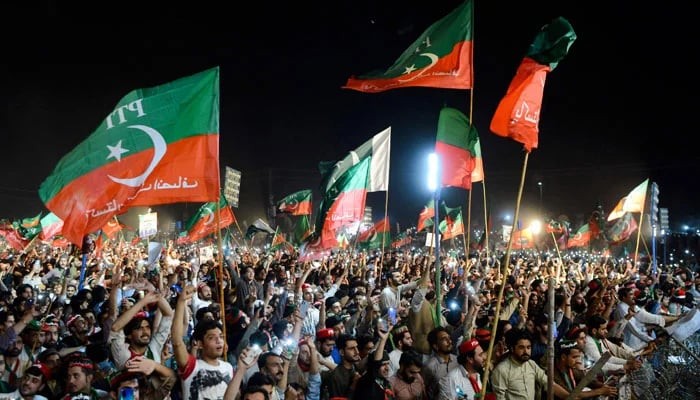It is pertinent to mention that this is the second petition filed with the apex court

PTI workers while at an election rally. — AFP/File
ISLAMABAD: The Pakistan Tehreek Insaaf (PTI) formally requested the Supreme Court on Monday to direct the president to announce the election date within 90 days of the dissolution of the National Assembly and the ECP to issue the schedule accordingly.
The PTI filed a petition in the apex court through Secretary-General Omar Ayyub, under Article 184(3) of the Constitution, praying to declare as illegal and void ab initio the decision of the purported Council of Common Interest (CCI) dated August 5, 2023, approving the census, which may be declared to be illegal, unlawful, and void ab initio.
It is pertinent to mention that this is the second petition filed with the apex court. Earlier, Supreme Court Bar Association President Abid S. Zubairi had filed the same petition in the apex court.
Filed through Barrister Ali Zafar, the PTI prayed that the notification by the Bureau of Statistics to publish the 2023 census, dated May 8, 2023, be declared illegal, unlawful, and void ab initio, while the delimitation exercise proposed to be taken by the ECP, dated August 17, 2023, be declared illegal, unlawful, and void ab initio.
“Section 57(1) of the Election Act, 2017, providing that the date of elections is to be fixed by the ECP may be declared to be ultra vires the Constitution and being contrary to Articles 48(5)(a), 58(1), 105(3)(a), 112(1), and 224,” wherein it is stated that the president or governor is to set the date of elections after dissolution by them on the advice of the prime minister or chief minister, the PTI further prayed
The PTI has made the Election Commission of Pakistan, the federation, the Ministry of Parliamentary Affairs, the Council of Common Interest (CCI), the chief secretaries of Punjab, Khyber, Sindh, Balochistan, and others respondents.
The PTI further prayed to the apex court that the Sindh governor may be required to announce the date of elections within 90 days of the dissolution of the Sindh Assembly and the ECP be directed to issue the election schedule accordingly, while the Balochistan governor may be required to announce the date of elections within 90 days of the dissolution of the Balochistan Assembly and the ECP be directed to issue the election schedule accordingly.
The elections to the Punjab and KPK assemblies may be held according to the judgments of this court and within a time frame fixed by the court.
The PTI submitted that, vexatiously, the census is being used by the ECP as an excuse to delay the elections to the National Assembly, as shown by the ECP in its reply dated August 24, 2023, to the letter of the president dated August 23, 2023.
He submitted that under Section 17(2) of the Election Act, 2017, the ECP is to delimit constituencies after every census is officially published.
The ECP had announced in the press on August 17, 2023, that it can’t delimit constituencies before December 2023, i.e., after the constitutionally mandated 90-day period is over.
He contended that before the dissolution of the National Assembly on August 9, 2023, a meeting of the so-called Council of Common Interest was held on August 5, 2023, in which the new census of 2023 was approved.
He submitted that the CCI was quorum non-judice as it consisted of two caretaker chief ministers—KPK and Punjab—who were not politically elected and did not represent the voters of the provinces (more than 51% of Pakistan’s total population) and, as such, have no right to represent them or their interests and therefore cannot, under the law, take permanent decisions like approving the census, which directly affects the two unrepresented provinces.
“In this respect, any approval by this wrongly constituted body is therefore unlawful and of no legal effect”, the PTI contended, adding that on August 8, 2023, the census was published by the Bureau of Statistics of Pakistan, and the census is based on the decision of the CCI, which is also illegal. Omar Ayyub submitted that the instant petition involves a matter of public importance as it seeks to uphold the fundamental rights outlined in Chapter 1 of Part II, as enshrined under Article 184(3) of the Constitution of Pakistan. He submitted that the constitutional requirement to hold elections within 90 days, as specified in Article 224(2), is a crucial and obligatory aspect of the Constitution, directly impacting the fundamental rights of the citizens. He contended that the respondents are depriving the petitioners (and all other citizens of Pakistan) of the fundamental right guaranteed under Article 17 of the Constitution to contest and participate in elections. “Unless the dates of the elections are announced, the exercise of this right will be frustrated”, the PTI submitted, adding that under Article 224(2) of the Constitution, when the provincial or National Assembly is dissolved, general elections to the assembly are mandatory to be held within 90 days.











